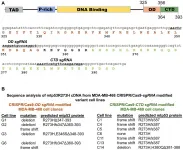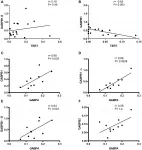(Press-News.org) The Covid-19 pandemic and the politicization of health-prevention measures such as vaccination and mask-wearing have highlighted the need for people to accept and trust science.
But trusting science isn't enough.
A new study finds that people who trust science are more likely to believe and disseminate false claims containing scientific references than people who do not trust science. Reminding people of the value of critical evaluation reduces belief in false claims, but reminding them of the value of trusting science does not.
"We conclude that trust in science, although desirable in many ways, makes people vulnerable to pseudoscience," the researchers write. "These findings have implications for science broadly and the application of psychological science to curbing misinformation during the COVID-19 pandemic."
"People are susceptible to being deceived by the trappings of science," said co-author Dolores Albarracín, the Alexandra Heyman Nash Penn Integrates Knowledge University Professor of the University of Pennsylvania. She said, for example, that Covid-19 vaccines have been the target of false claims that they contain pollutants or other dangerous ingredients. "It's deception but it's pretending to be scientific. So people who are taught to trust science and normally do trust science can be fooled as well."
Albarracín, a social psychologist and director of the Science of Science Communication Division of the Annenberg Public Policy Center of the University of Pennsylvania, said, "What we need are people who also can be critical of information. A critical mindset can make you less gullible and make you less likely to believe in conspiracy theories."
The study, conducted by Albarracín and colleagues when she was in her former position at the University of Illinois at Urbana-Champaign, was published recently in the Journal of Experimental Social Psychology.
The experiments: Misinformation about a virus and GMOs
For the study, researchers conducted four preregistered experiments with online participants. The researchers created two fictitious stories - one about a virus created as a bioweapon, mirroring claims about the novel coronavirus that causes Covid-19, and the other about an unsubstantiated conspiracy theory about the effects of genetically modified organisms or GMOs on tumors.
The invented stories contained references to either scientific concepts and scientists who claimed to have done research on the topic or descriptions from people identified as activists. Participants in each experiment, ranging from 382 to 605 people, were randomly assigned to read either the scientific or non-scientific versions of the stories.
Findings
What the researchers found was that among people who did not have trust in science, the presence of scientific content in a story did not have a significant effect. But people who did have higher levels of trust in science were more likely to believe the stories with scientific content and more likely to disseminate them.
In the fourth experiment, participants were prompted to have either a "trust in science" or a "critical evaluation" mindset. Those primed to have a critical mindset were less likely to believe the stories, whether or not the stories used seemingly scientific references. "The critical mindset makes you less gullible, regardless of the information type," Albarracín said.
"People need to understand how science operates and how science arrives at its conclusions," Albarracín added. "People can be taught what sources of information to trust and how to validate that information. It's not just a case of trusting science, but having the ability to be more critical and understand how to double-check what information is really about."
The lead author, postdoctoral researcher Thomas C. O'Brien of the University of Illinois at Urbana-Champaign, added, "Although trust in science has important societal benefits, it is not a panacea that will protect people against misinformation. Spreaders of misinformation commonly reference science. Science communication cannot simply urge people to trust anything that references science, and instead should encourage people to learn about scientific methods and ways to critically engage with issues that involve scientific content."
The researchers concluded: "Although cynicism of science could have disastrous impacts, our results suggest that advocacy for trusting science must go beyond scientific labels, to focus on specific issues, critical evaluation, and the presence of consensus among several scientists... Fostering trust in the 'healthy skepticism' inherent to the scientific process may also be a critical element of protecting against misinformation ... Empowering people with knowledge about the scientific validation process and the motivation to be critical and curious may give audiences the resources they need to dismiss fringe but dangerous pseudoscience."
INFORMATION:
In addition to Albarracín and O'Brien, the research was conducted by Ryan Palmer of the University of Illinois at Urbana-Champaign. "Misplaced trust: When trust in science fosters belief in pseudoscience and the benefits of critical evaluation" was published in the Journal of Experimental Social Psychology. The work was supported by grants from the National Science Foundation, National Institute of Drug Abuse, and National Institutes of Health.
The Annenberg Public Policy Center was established in 1993 to educate the public and policy makers about communication's role in advancing public understanding of political, science, and health issues at the local, state, and federal levels.
DALLAS, July 26, 2021 -- People who are just beginning treatment for high blood pressure can benefit equally from two different classes of medicine - angiotensin-converting enzyme (ACE) inhibitors and angiotensin receptor blockers (ARBs) - yet ARBs may be less likely to cause medication side effects, according to an analysis of real-world data published today in Hypertension, an American Heart Association journal.
While the class of blood pressure-lowering medicines called angiotensin-converting enzyme (ACE) inhibitors may be prescribed more commonly, angiotensin receptor blockers (ARBs) work just as well and may cause fewer side effects. Currently, ACE inhibitors are prescribed more commonly than ARBs as a first-time blood pressure ...
DALLAS, July 26, 2021 -- Genomic studies have produced advances in how to calculate and reduce heart-disease risk, however, the benefits don't necessarily apply to people from historically marginalized racial and ethnic groups and Indigenous populations. Efforts must be made to eliminate barriers to increase their participation in genomic research, according to a new scientific statement from the American Heart Association, published today in the Association's journal Circulation: Genomic and Precision Medicine.
"Profound breakthroughs in genetic and genomic science are rapidly improving our ability to prevent, detect and treat cardiovascular ...
NEW YORK, NY (July 26, 2021)--Two types of drugs that are recommended as a first treatment for patients with high blood pressure were found equally effective in improving cardiovascular outcomes, but the more popular type causes slightly more side effects, finds a multinational observational study led by researchers at Columbia University Vagelos College of Physicians and Surgeons.
The study, which analyzed claims and electronic health data from millions of patients worldwide, is the largest to compare the safety and efficacy of angiotensin-converting ...
Citrus fruits from the mandarin family have important commercial value but how their diversity arose has been something of a mystery
Researchers analyzed the genomes of the East Asian varieties and found a second center of diversity in the Ryukyu Islands along with the previously known center in the mountains of southern China
They discovered a new citrus species native to Okinawa that arose about two million years ago when the Ryukyu archipelago became disconnected from mainland Asia
Other citrus from Okinawa and mainland Japan, including shiikuwasha and tachibana, are hybrids of this newly discovered wild species with different mainland Asian varieties
This research may have commercial implications and ...
Canada should anticipate a resurgence of a childhood respiratory virus as COVID-19 physical distancing measures are relaxed, authors warn in CMAJ (Canadian Medical Association Journal).
Cases of respiratory syncytial virus (RSV) have risen sharply in Australia and, more recently, the United States as COVID-19 case counts have waned and pandemic public health measures have been relaxed. Respiratory syncytial virus affects the lower respiratory tract and can cause serious illness and death. Before the COVID-19 pandemic, about 2.7 million children worldwide were infected with RSV each year, and it was the fourth most common cause of death in young children.
"The off-season resurgence in seasonal respiratory viruses now potentially poses a threat to vulnerable infants," ...
A new "return to campus" survey led by The Ohio State University's Office of the Chief Wellness Officer finds rising rates of anxiety, depression, burnout and the use of unhealthy coping mechanisms among students navigating through a year affected by the COVID-19 pandemic, similar to other data on college students throughout the U.S.
Ohio State conducted surveys in August 2020 and April 2021 of randomly-selected students to assess changes in mental health, coping strategies, healthy lifestyle behaviors and needs over time. Among the 1,072 Ohio State students who responded:
Students who screened positive for anxiety:
August 2020: 39%
April 2021: 42.6%
Students who screened positive for depression:
August 2020: 24.1%
April 2021: 28.3%
Students who screened ...
PITTSBURGH, July 26, 2021 - Adolescents who set goals for their future and those with strong parental support are less likely to use e-cigarettes and other tobacco products, according to a study by UPMC Children's Hospital of Pittsburgh and University of Pittsburgh School of Medicine physician-scientists.
The research, published today in the journal Pediatrics, suggests that strategies to prevent youth vaping may be different from what works to dissuade youth from smoking cigarettes.
"The use of e-cigarettes by young people is at epidemic proportions, with 27% of youth ...
Survival rates for adolescents and young adults diagnosed with cancer have varied considerably depending on cancer type. A new study indicates that survival for multiple cancer types in such patients has improved in recent years, but some patients diagnosed with common cancer types still show limited survival improvements. The results are published by Wiley early online in CANCER, a peer-reviewed journal of the American Cancer Society.
For the study, investigators at the National Cancer Institute analyzed survival trends related to cancers with the highest mortality rates in adolescents and young adults. Relying on information from the Surveillance, Epidemiology, and End Results (SEER) cancer ...
Oncotarget published "Frame-shift mediated reduction of gain-of-function p53 R273H and deletion of the R273H C-terminus in breast cancer cells result in replication-stress sensitivity" which reported that these authors recently documented that gain-of-function mutant p53 R273H in triple negative breast cancer cells interacts with replicating DNA and PARP1. The missense R273H GOF mtp53 has a mutated central DNA binding domain that renders it unable to bind specifically to DNA, but maintains the capacity to interact tightly with chromatin.
Both the C-terminal domain ...
Oncotarget published "TERT and its binding protein: overexpression of GABPA/B in high grade gliomas" which reported that all GA-binding proteins progress through the glioma grades and have the highest expression levels in secondary glioblastomas.
In secondary glioblastomas after chemotherapy, GABPB1 and GABPB1-L are expressed on a lower level than without treatment.
Between primary and secondary glioblastomas with and without chemotherapy, TERT is elevated in the former while GABPB1 is increased in the secondary glioblastomas.
GABPA and GABPB1, GABPB1-L and GABPB1-S positively correlate in primary glioblastomas.
This ...



